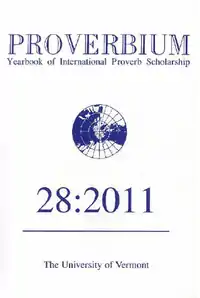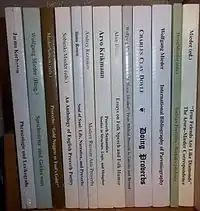Proverbium
Proverbium: Yearbook of International Proverb Scholarship (ISSN 0743-782X) is an academic journal covering paremiology, the study of proverbs. It is published annually by the University of Vermont and was established in 1985. Since volume 2, the editor-in-chief is Wolfgang Mieder. Each volume includes articles on proverbs from around the world, reviews of books, a bibliography of recent proverb scholarship, and a list of recently (re)published proverb collections.[1]


The journal succeeded Proverbium: Bulletin d'Information sur les Recherches Parémiologiques[2] (ISSN 0048-5667), which was established by Matti Kuusi and published occasionally by the Finnish Literature Society between 1965 and 1975.[3] The journal is one of two ongoing proverb journals listed as a significant source for proverb studies in Proverbs: a Handbook (page 258).[4] It is also listed as one of a list of "Proverb Resources" by the Cog Web site.[5] Also, it is the only current journal listed by the University of Chicago's Defining Wisdom project in their Wisdom Literature Review.[6] It is one of only two journals cited by the International Association of Paremiology on their website.[7] Proverbium is indexed by the MLA International Bibliography, RILM Abstracts of Music International, and Russian Academy of Sciences Bibliographies. Julia Sevilla Muñoz, editor of the journal Paremia, has described it saying, "Proverbium est devenu premier point de recontre et d'échange scientifique pour les vrais spécialistes en parémies."[8] Two volumes of Proverbium were seen to be significant enough for a review in the journal Fabula.[9]
In addition to the journal itself, there is a "Supplement Series" of volumes published by Proverbium. So far, 39 volumes have been published in this book series.
Many of the back issues of Proverbium are freely available online at HathiTrust.
References
Citations
- Bradbury, Nancy Mason. 2002. Transforming Experience into Tradition: Two Theories of Proverb Use and Chaucer’s Practice. Oral Tradition, 17/2: 261-289, see p. 262, fn. 2.
- p. 1. Arvo Krikmann. 2009. Proverb semantics: Studies in structure, logic, and metaphor. (Supplement series of Proverbium, 29.) Burlington: University of Vermont.
- p. 217. Outi Lauhakangas. 2013. The Maati Kuusi international database of proverbs. Oral Tradition 28.2: 217-222.
- Mieder, Wolfgang (2004). Proverbs: A handbook. Westport, Conn: Greenwood Press. ISBN 0-313-32698-3. OCLC 54960019.
- "Proverb Resources". Cogweb.ucla.edu. 2003-11-08. Retrieved 2012-02-25.
- "Archived copy" (PDF). Archived from the original (PDF) on 2012-09-05. Retrieved 2012-02-25.CS1 maint: archived copy as title (link)
- "Introduction". Colloquium-proverbs.org. Retrieved 2012-02-25.
- p. 10. Muñoz, Julia Sevilla. 2002. Préface. Proverbes et énoncés sentencieux, edited by Michel Quitout. Editions L'Harmattan.
- Neumann, Siegfried. Fabula Vol. 35, (Jan 1, 1994): 183-185.